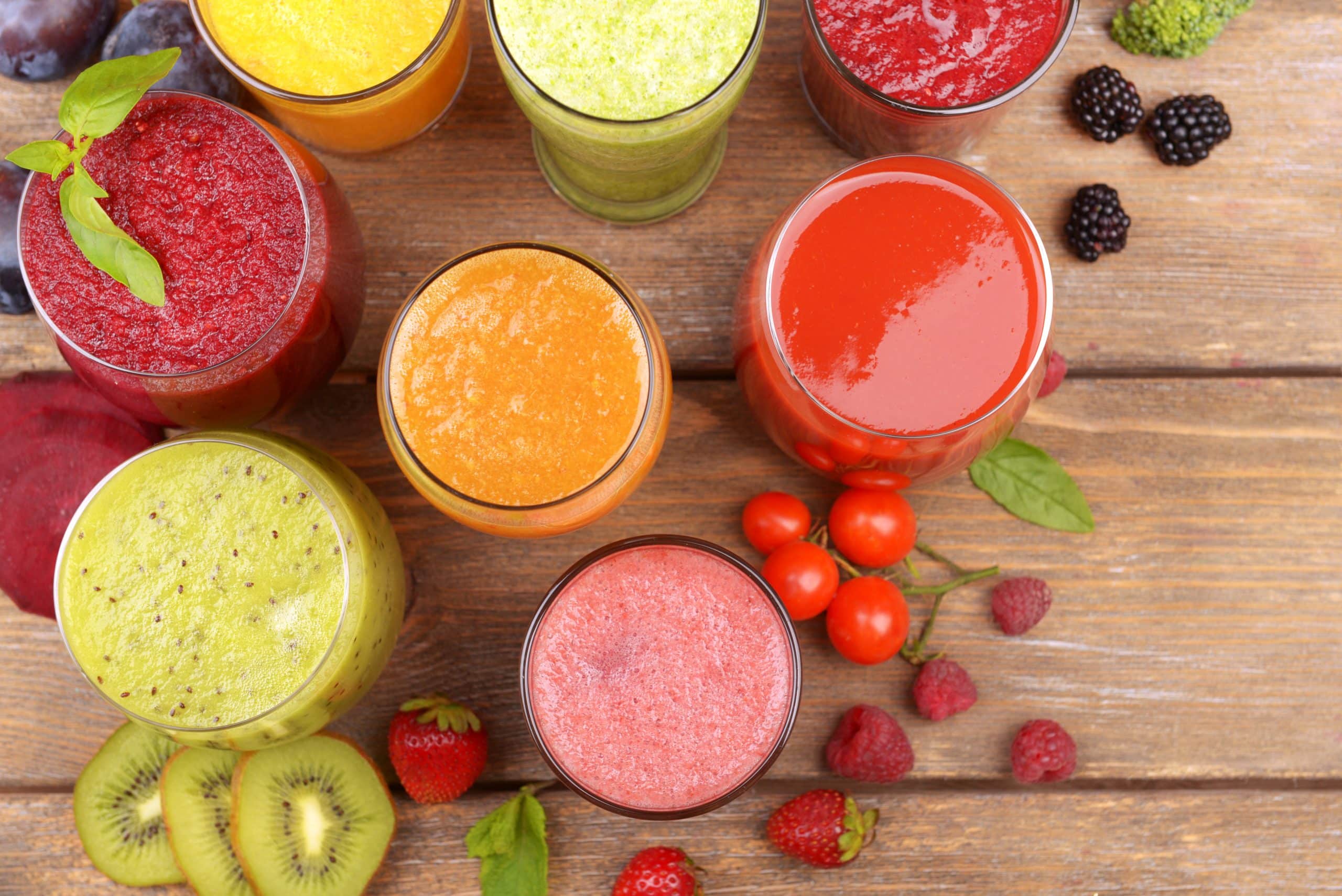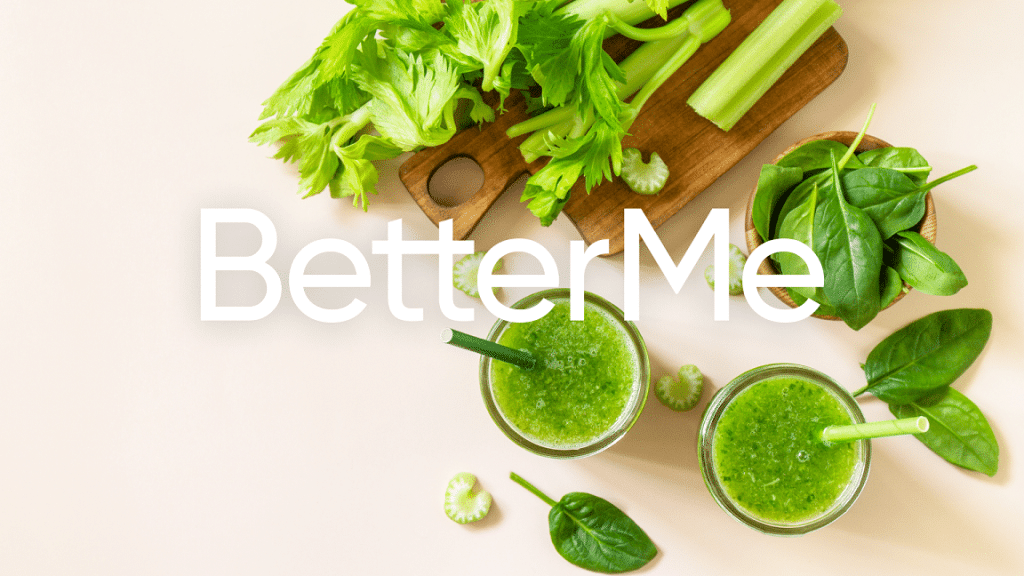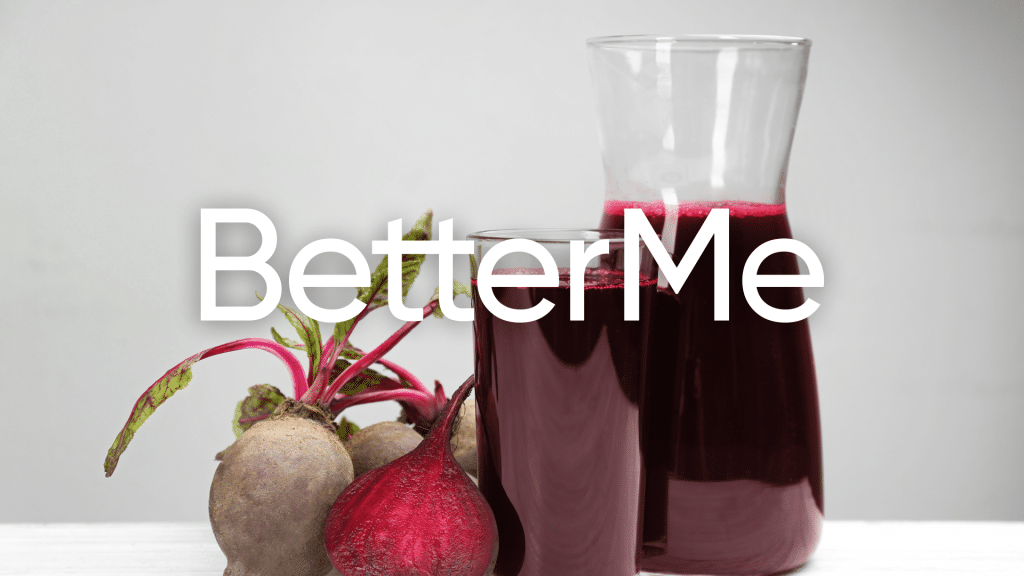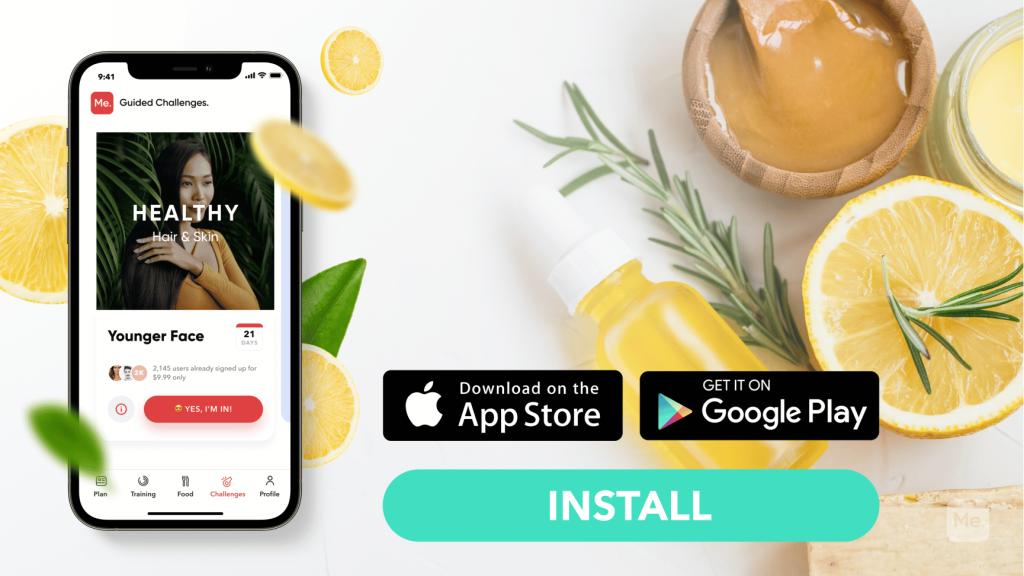Juicing is the process of extracting liquid/juice from fruits and vegetables. The search for delicious juicing recipes has increased exponentially due to the rumored benefits from consuming fruit and veggie juices. In this article, we shall be discussing 10 benefits of juicing to help you better understand how juicing could potentially improve your health.
Get your personalized
meal plan!
What Are The Benefits Of Juicing?
The purported benefits of juicing range from supporting the immune system, aiding weight loss and management, and more. However, it should be noted that these benefits are mostly speculative, as scientific research on extracted juices is still lacking. Many of the purported benefits are based on the benefits of eating more fruits and vegetables, which isn’t quite the same as drinking their juice.
What Are The Long Term Benefits Of Juicing?
Despite little research in this matter, juicing is still quite the popular practice among many health conscious people. If you love juicing or are interested in it, here are some potential 10 benefits of juicing that you may enjoy.
Increased Nutrients Intake
A diet high in fruits and vegetables is recommended to people of all ages as they are a good source of numerous minerals and vitamins (28). Good nutrition may lower the risk of chronic illnesses and keep you healthy (29). Unfortunately, despite knowing this, many people still do not consume enough fruits and vegetables.
According to statistics provided by the CDC, less than 15 percent of adults meet the recommended daily intake of these two foods (1). If you suspect that you are among these people who do not meet the recommended intake due to various reasons, then juicing could be good for you.
Some studies have shown that improving nutrient levels is one of the benefits of juicing once a day
- A study published in the Journal of the American Nutrition Association found that supplementing diets with mixed fruit and vegetable juice effectively increased antioxidant and nutrient levels in participants’ blood.
Nutrients that increased the most in the participants’ blood levels included beta-carotene, vitamin C, vitamin E, selenium and folate (21).
Read More: Benefits Of Cold Pressed Juice Will Make You Ditch Your Fav Box-Brand Juice
Could Help You Sleep Better
Sleep deficiency is a public health epidemic that goes mostly unnoticed. In the US, it is estimated that 1 in 3 adults fail to get enough sleep everyday. Chronic sleep disorders are a thing that affects up to 70 million Americans (27). Lack of enough sleep leads to multiple negative side effects such as (20):
- Poor judgment and decision making skills
- Reduced alertness and awareness of the environment and situation
- Poor memory and attention span
- Lack of energy
- Unpredictable mood swings
- Poor mental health with increased risk of anxiety and depression
- Increased risk of chronic illnesses e.g. heart disease, kidney disease, high blood pressure, diabetes, stroke, and obesity.
Luckily, scientific research has shown that increased fruit and vegetable intake can improve insomnia-related sleep difficulties (8).
Increased Energy Levels
If you always feel tired, no matter how much rest or sleep you have, it could be because your body lacks proper nutrients. Carbohydrates are what our bodies need and use to give us energy.
Juice contains natural sugars, which can give you a quick burst of energy. Unfortunately juicing gets rid of most fiber in fruits and vegetables. Fiber helps slow down nutrient absorption, helping that energy last longer.. To bypass this, try blending your fruit and vegetables whole once in a while to consume fiber to help boost your energy levels.
Some of the best such foods to use include bananas, apples, dark leafy greens, beets, oranges, strawberries and avocados.
Improved Concentration And Cognitive Function
When it comes to boosting brain power, nothing beats a diet rich in natural foods. A review published in 2019 found that an adequate intake of fruits and vegetables is important for the maintenance of normal cognitive functions.
The researchers found that these foods contain polyphenols that work to inhibit free radicals from negatively impacting the brain (9).
Improved Quality Of Life
As previously mentioned juicing helps increase the amount of nutrients you consume a day. If you are constantly sick because your immune system isn’t getting what it needs, juicing can provide the necessary nutrients to improve your immunity making you healthier. The healthier you are, the better your quality of life.
May Reduce Premature Aging
When you hear people mention juicing benefits and skin positives in the same sentence, they are not making things up. The skin is the first part of the body that displays signs of premature aging. Such signs often include wrinkles, age spots, dryness or loss of skin tone, etc.
A review published in 2022 revealed that plant-based foods including fruits and vegetables contain bioactive compounds that provide a foundation for healthy skin. You can consume such compounds like vitamin C, vitamin E, beta carotene, polyphenols, and phenolic acids, through juicing (18).
An older study published in 2012 also showed the very close link between nutrition and skin aging. Study researchers concluded that eating more fruits and vegetables was the healthiest and safest way to achieve youthful skin through nutrition (6).
When it comes to weight loss, progress is made by inches, not miles, so it’s much harder to track and a lot easier to give up. BetterMe app is your personal trainer, nutritionist and support system all in one. Start using our app to stay on track and hold yourself accountable!
Improved Bone Health
Weak bones is an issue that affects many older adults all over the world. In the United States alone, over 1.5 million cases of osteoporotic fractures are reported each year. The statistics for emergency room visits, hip fractures, and physician visits due to poor bone health number in the hundreds of thousand each year (22).
Calcium is an essential nutrient for good bone health. It can be found in easy to juice foods like broccoli, cabbage, brussel sprouts, collards, kale, and mustard greens (10). An increased intake of fruits and vegetables has been shown to have bone protective effects and may decrease the risk of fractures (12).
May Reduce Blood Pressure And Protect The Heart
Juicing more fruits and vegetables might reduce your risk of high blood pressure, protecting you and your heart from heart diseases and stroke. A 40 year study conducted from 1975 to 2015 showed that countries with a higher fruit and vegetable supply showed a lower prevalence for high blood pressure (30).
In another study published in 2017, researchers advocated for the increased consumption of these foods – especially whole fruits – as it may reduce the risk of developing hypertension (11).
As previously stated, juicing helps increase the intake of fruits and vegetables, however it is not the same as eating the whole fruits and vegetables, which is what may help lower blood pressure.
Weight Loss And Management
Such juices can help curb cravings and also can be low in calories. Remember that a calorie deficit is one of the most important factors in weight loss.
Increased Hydration
If you have a problem with drinking plain water, such juices are a healthier alternative to drinking other sugary beverrages. Please remember that these juices should not fully replace water – try to drink some throughout the day.
What Are The Benefits Of A 7 Day Juice Fast?
Seeing these 10 benefits of juicing, some people may be tempted to try a 7 day juice fast or the 10 day juicing diet. Please note that such fasts and diets – especially those that promise incredible weight loss, are nothing but an unsafe fad.
A juicing diet/fast is classified as a very low calorie diet and such diets should only be done under strict supervision by a medical professional. It should also be noted that the weight loss sustained by such diets is not sustainable long term (25, 26).
Read More: 10 Vegetable Juice Benefits That’ll Get You Juicing Right Away
What Is The Best Time To Drink Juice?
There is no specific time to drink juice. Your body will still reap these potential 10 benefits of juicing no matter the time of day you choose to consume the drink. However, some sources claim that your body will best get the benefits of fruit juice in the morning.
They claim that drinking these juices on an empty stomach ensures that your body will absorb all the nutrients. Please note that there is no scientific evidence backing these claims.
What Are The Top 10 Benefits Of Juicing Ginger?
Ginger shots have quickly grown in popularity with many health stores having them on demand for customers. Here are some possible benefits of juicing and consuming ginger shots
- Reduced digestive issues – This root may help improve digestion, decrease bloating, and reduce intestinal cramping (14).
- Reduce nausea in pregnant women as well as patients undergoing cancer treatments (8).
- Reduced inflammation (7).
- Increased antioxidants in the body – Aside from having anti-inflammatory properties, this root also has antioxidants properties that may prevent disease (3).
- Possibly protective against ulcers (19).
- Improved immune health – this is in relation to the many antioxidants and anti-inflammatory properties found in ginger.
- May help prevent certain cancers (13).
- May assist with weight loss (23).
- May help diabetic patients with controlling blood sugar (24).
- May help with pain management in patients suffering from osteoarthritis (9).
If you wish to free yourself from all the extra pounds that have been weighting you down for way too long, start using the BetterMe app and overhaul your entire life!
FAQs
What Are 10 Health Benefits Of Spinach Juice?
While spinach is one of the best leafy greens out there, there isn’t much research on the benefits of juicing it. However, spinach is an antioxidant powerhouse and thus adding it to your juicing recipes may help support your overall health (17, 2).
Is It Healthy To Juice Everyday?
Yes, it can be.
However, it is important to remember that juicing – unlike blending – gets rid of a lot of important fiber from the fruits and veggies. Make sure to get your recommended daily intake of fiber from whole foods, specifically from complex carbohydrates.
Do not try any juicing diet or fast as these aren’t healthy either and always try to incorporate whole fruits and vegetables to your healthy balanced diet – alongside juicing.
How Much Weight Can You Lose Juicing For 10 Days?
As previously mentioned, a 10 day juicing diet is something that is highly discouraged. Do not attempt just a meal plan and instead stick to healthy weight loss methods. You can consume juices as part of a healthy balanced diet. Also try to incorporate some movement. These may take longer to achieve the results you want, but they are sustainable in the long term. Healthy weight loss is where you lose 1 to 2 pounds a week (16).
Is Juicing Once A Day Beneficial?
As seen from the 10 benefits of juicing, consuming more fruits and vegetables can really improve your life and health. However, remember that juices are not a substitute for healthy balanced meals. They are better used as snacks or meal accompaniments.
The Bottom Line
The 10 benefits of juicing mostly come from the nutrients, antioxidants and anti-inflammatory properties found in fruits and vegetables. These properties might help with weight loss, increased immunity, improved bone and gut health, better heart and brain health, smoother younger skin and much more.
Despite the many benefits, it is important to note that juice fasts and diets for weight loss are unsafe for your health and highly discouraged. Juicing shouldn’t replace a balanced diet. This means whole fruits and vegetables should still be included in your meal plan.
DISCLAIMER:
This article is intended for general informational purposes only and does not serve to address individual circumstances. It is not a substitute for professional advice or help and should not be relied on for making any kind of decision-making. Any action taken as a direct or indirect result of the information in this article is entirely at your own risk and is your sole responsibility.
BetterMe, its content staff, and its medical advisors accept no responsibility for inaccuracies, errors, misstatements, inconsistencies, or omissions and specifically disclaim any liability, loss or risk, personal, professional or otherwise, which may be incurred as a consequence, directly or indirectly, of the use and/or application of any content.
You should always seek the advice of your physician or other qualified health provider with any questions you may have regarding a medical condition or your specific situation. Never disregard professional medical advice or delay seeking it because of BetterMe content. If you suspect or think you may have a medical emergency, call your doctor.
SOURCES:
- Adults Meeting Fruit and Vegetable Intake Recommendations — United States, 2019 (2022, cdc.gov)
- Antioxidant Effects of Spinach (Spinacia oleracea L.) Supplementation in Hyperlipidemic Rats (2014, ncbi.nlm.nih.gov)
- Anti-Oxidative and Anti-Inflammatory Effects of Ginger in Health and Physical Activity: Review of Current Evidence (2013, ncbi.nlm.nih.gov)
- Changes in fruit and vegetable consumption in relation to changes in sleep characteristics over a 3-month period among young adults (2021, sciencedirect.com)
- Cognitive Function and Consumption of Fruit and Vegetable Polyphenols in a Young Population: Is There a Relationship? (2019, ncbi.nlm.nih.gov)
- Discovering the link between nutrition and skin aging (2012, ncbi.nlm.nih.gov)
- Effect of Ginger on Inflammatory Diseases (2022, ncbi.nlm.nih.gov)
- Effect of Ginger on Relieving Nausea and Vomiting in Pregnancy: A Randomized, Placebo-Controlled Trial (2014, ncbi.nlm.nih.gov)
- Efficacy and safety of ginger in osteoarthritis patients: a meta-analysis of randomized placebo-controlled trials (2015, sciencedirect.com)
- Food for healthy bones (2021, nhs.uk)
- FRUIT AND VEGETABLE CONSUMPTION AND THE INCIDENCE OF HYPERTENSION IN THREE PROSPECTIVE COHORT STUDIES (2017, ncbi.nlm.nih.gov)
- Fruit and vegetable intake and bones: A systematic review and meta-analysis (2019, ncbi.nlm.nih.gov)
- Ginger and Its Constituents: Role in Prevention and Treatment of Gastrointestinal Cancer (2015, ncbi.nlm.nih.gov)
- Ginger in gastrointestinal disorders: A systematic review of clinical trials (2019, ncbi.nlm.nih.gov)
- Health Effects of Mixed Fruit and Vegetable Concentrates: A Systematic Review of the Clinical Interventions (2011, tandfonline.com)
- Losing Weight (2022, cdc.gov)
- Nutrients and bioactives in green leafy vegetables and cognitive decline (2018, ncbi.nlm.nih.gov)
- Plant-Based Foods for Skin Health: A Narrative Review (2022, sciencedirect.com)
- Protective Effects of Ginger against Aspirin-Induced Gastric Ulcers in Rats (2011, ncbi.nlm.nih.gov)
- Sleep Deprivation (2023, sleepfoundation.org)
- Supplementation with Mixed Fruit and Vegetable Juice Concentrates Increased Serum Antioxidants and Folate in Healthy Adults (2004, tandfonline.com)
- The Burden of Bone Disease (n.d., ncbi.nlm.nih.gov)
- The effects of ginger intake on weight loss and metabolic profiles among overweight and obese subjects: A systematic review and meta-analysis of randomized controlled trials (2019, pubmed.ncbi.nlm.nih.gov)
- The Effects of Ginger on Fasting Blood Sugar, Hemoglobin A1c, Apolipoprotein B, Apolipoprotein A-I and Malondialdehyde in Type 2 Diabetic Patients (2015, ncbi.nlm.nih.gov)
- Very Low Calorie Diet (n.d., sciencedirect.com)
- Very-Low-Calorie Diets and Sustained Weight Loss (2012, onlinelibrary.wiley.com)
- What Are Sleep Deprivation and Deficiency? (2022, nhlbi.nih.gov)
- Why 5 A Day? (2022, nhs.uk)
- Why It Matters (2021, cdc.gov)
- Worldwide associations of fruit and vegetable supply with blood pressure from 1975 to 2015: an ecological study (2023, nutrition.bmj.com)











